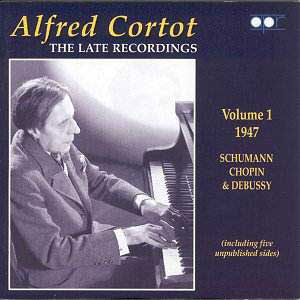Cortot’s reappearance at the end of the War was fraught
with recrimination concerning the nature and extent of his conduct under
the Vichy regime. At a tribunal he was suspended from appearing in Paris
for one year – a ban that effectively banished Cortot from the capital
until April 1946 but was in fact effective until the beginning of 1947
as union pressure led to the cancellation of a concerto engagement.
In the event, after a piano recital, Cortot wasn’t to play in Paris
again until 1949. In the interim he cast around to continue his recording
life, but ran into material shortages in London. Only two waxes per
side were possible during his 1947 sessions with the exception of greater
luxury in two of the Chopin sides, the E Flat Nocturne and the fearsome
Polonaise Op 61, which both ran to three takes. As Bryan Crimp’s notes
explain the recordings were not entirely smooth. Cortot was ill, somewhat
unreliable and the atmosphere throughout was somewhat less than sympathetic
to the Frenchman (Crimp cites engineer David Bicknell’s intolerance
toward Cortot’s self-evident fallibility). Indeed tolerance is explicitly
entreated throughout towards Cortot’s pianism – and occasionally this
is just. What emerges once more, however, despite the finger slips and
sometimes blustering playing is, simply, just how beautiful a musician
he was until the very end.
Kinderszenen is full of subtle pointing, the simplicity
of his rubato in Von fremden Landern und Menschen and the teasing
show of Kuriose Geschichte but a glimpse into his range of romantic
devices. He characterises each piece with sovereign skill and can conjure
up a depth of bass sonorities (as in Wichtige Begebenheit) as
well as bring out with unselfconscious rightness inner voicings (listen
to Ritter vom Steckenpferd) Fast zu ernst ends with a touchingly
rapt simplicity and the final scene with an inwardness and truthfulness
tinged with fantasy that animates Cortot’s playing throughout. The F
Minor Nocturne is played with unexaggerated and well-scaled intimacy
and its companion exists in two takes. The issued take is notable for
a range of tone colours and a properly reflective tempo; the unissued
take, being in poorer aural condition, sounds somewhat recessed and
wooden and with a few finger slips. The three Nouvelles etudes are similarly
unissued – and very valuable to have. Again there are slips, but the
level of characterization is again of a superior level; his little light
staccato shafts and milky treble runs flecking the music with colour
and nuance (I particularly commend the D Flat, No 3 in this respect).
The C Sharp Minor Prelude is again an invaluable addition to the discography
– another of the 10th November sessions not to be issued,
as is the Polonaise-Fantasie. This is conjecturally supposed to have
rushed Cortot because it was to have been issued over two 12" sides.
What remains unequivocally true is that it sounds too fast, there’s
a lot of rubato, some unwelcome, and from 8’50 a real technical pile
up. Finally in the Debussy he is dazzlingly colouristic, using the pedal
to optimum effect and in the Golliwog’s Cake-walk consumed with rhythmic
élan. This is the first volume in a series that documents that
relatively overlooked post-War Cortot discography. Despite all the political
complications, the errant fingers and poor health he remains sui generis
and an unforgettably great musician.
Jonathan Woolf


